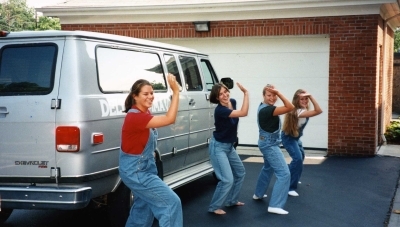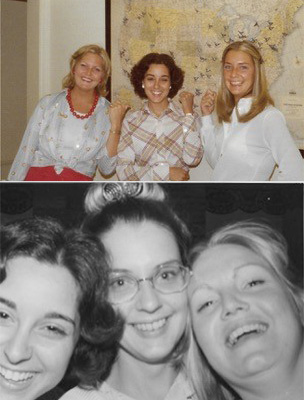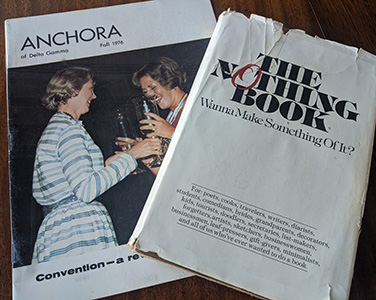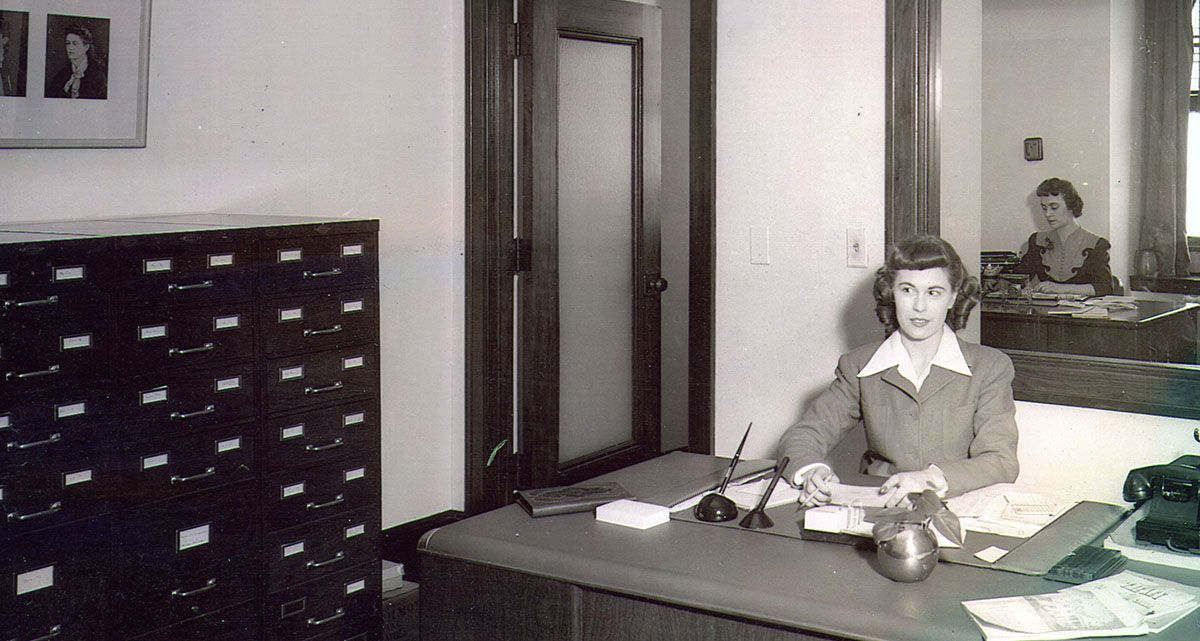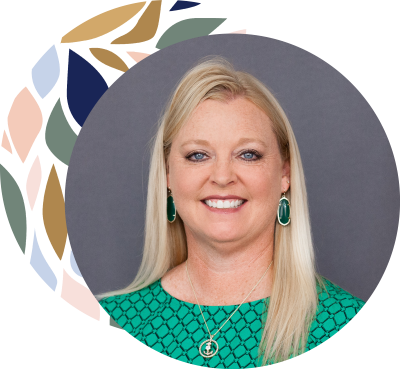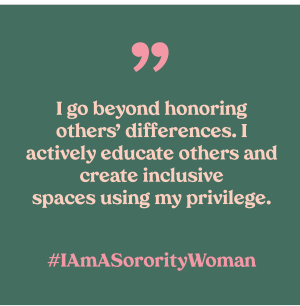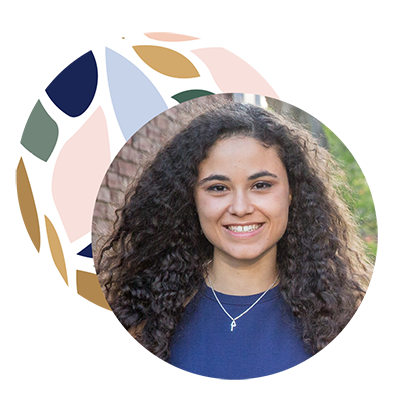The Impacts of Microaggressions: Hearing from Fellow DGs
On Wednesday, June 10, Delta Gamma was joined by 317 individuals for our virtual panel discussion on “The Impacts of Microaggressions.” This talk was hosted by four DG alumnae who had expressed interest in speaking to their fellow sisters about their experiences as Black women in Delta Gamma. Planned back in May, the timing of this talk could not have been more poignant, amid worldwide protests against institutional and systemic racism that has impacted Black people for generations. As a historically white organization, it is our duty to use our privilege to advocate for change and create communities that are equitable and just. And we understand that self-reflection and growth at the individual level is just as crucial to creating this change.
You can watch the Article II Talk here. While we encourage you to set aside time to watch the entirety of this two-hour conversation, we have also summarized some of the points made by our sisters in this blog. (Note: this is not an exhaustive list of the many questions that these four panelists discussed, so watching the entire talk is important!)
meet the panelists:
Amarachi Ekekwe, Epsilon Beta-Bucknell: Amarachi is a graduate student at Carnegie Mellon University, studying to receive her Masters in Entertainment Industry Management. Prior to starting grad school, Amarachi worked at Ogilvy Public Relations & Advertising Agency and interned at CNN, and the Posse Foundation. Amarachi graduated from Bucknell University in 2018 with a Bachelor of Arts in psychology and women’s & gender Studies. She was initiated into Epsilon Beta chapter of Delta Gamma at Bucknell in the Fall of 2015. As a member of Delta Gamma, Amarachi served as the sophomore member-at-large on Honor Board and the Peer Adviser/RA on the suite. Amarachi also served as the President of the Panhellenic Council at Bucknell from 2016-2017. You can always catch Amarachi with a notebook in her hand, as she loves to rap and sing, as well as dance. In the future, Amarachi hopes to be a Media Personality as well as work as an A&R at a record label.
Ari Rodriguez, Eta Alpha-Pepperdine: Arianna (or Ari as she is known to friends) is a lover of Jesus, the wife to her Forever and lucky enough to be the mom of two pretty rad kiddos. She enjoys delicious food, good conversations and loving the heck out of people. When not Momming (or in some cases, while Momming) she runs an outreach for women in the sex industry, works part time as a substitute teacher and has the pleasure of serving as the advisory team chairman for Gamma Chi-Cal State, Long Beach chapter of Delta Gamma.
Jasmin Shupper, Eta Alpha-Pepperdine: Jasmin Is a 2005 graduate of Pepperdine University with a degree in International Business. Upon graduating she worked as a financial analyst/underwriter, living in Philadelphia and Washington DC, and satisfying her love of travel. She met her husband at Pepperdine and they got married in 2009 and have two beautiful girls that keep them very busy and duly entertained. She also loves all things real estate and holds a California Real Estate license. A self-professed “foodie”, Jasmin loves eating good food, traveling, having conversations that bring about racial reconciliation and expose systems of injustice and is very involved with the Center for Racial Reconciliation at her church.
Sharon Jackson, (she/her/hers), Eta-Akron: Sharon is a double graduate of the University of Akron with a bachelors in theatre and a masters in higher education administration. After graduating with her masters she began working in housing and fraternity and sorority life on multiple campuses. She is currently an Assistant Director in housing at Kent State University and has been charged with leading the departmental social justice initiatives. She also serves as the on-campus advisor for Gamma Epsilon-Kent State chapter. Once she leaves campus, she spends an excessive amount of time at the dog park with her dog, Sir Winthrop, or reading/writing/presenting about diversity/identity/privilege.
what ARE microaggressions?
Sharon shares with us that they are defined as: brief and common daily verbal behavioral and environmental communications, whether intentional or unintentional, that transmit hostile, derogatory or negative messages to a target person, because they belong to a stigmatized group.
What are some examples of microaggressions?
Next, Sharon answered a common question from attendees, asking for what some examples of what a microaggression is. One that Sharon gets a lot is the question, “What are you?” Some other examples include statements/questions like:
- “Can I touch your hair?”
- The idea of ‘colorblindness” or telling someone that you don’t “see” their race
- Telling someone that they “speak so eloquently,” that they “don’t sound Black,” or that they “speak English so well”
- “How can I be racist? I have Black friends.”
- Blocking your car door when a Black person walks by.
Here is a microaggressions chart shared by the panelists, which outlines further examples.
the q&a
First, each of the panelists gave a response to the question, “As a collegian or young adult, did you always feel comfortable in your skin? If so, or if not, what were your roadblocks?” Below is an excerpt from Jasmine about her experiences.
- “It’s an interesting question, it’s definitely a layered and complex question … I think there was also a sense of coming of age and owning who I was in my own skin. I think that there were times, honestly, where I did not feel comfortable. And not because necessarily of anything that anybody perpetuated against me intentionally, there were definitely microaggressions that have an impact that was maybe different from the intent … In college, I went through a process where there was a sense of otherness – where white was assumed to be the norm, and if you were not white, then you were ‘other.’ Of course, that was never explicit, but it was absolutely implicit in so many circles … Anytime [there were] unique and beautiful elements that come along with my blackness that I wanted to talk about, speak about, or even address, very well-intentioned people were like, ‘Well I don’t see color.’ Colorblindness assumes that white is the standard. … Which made me second guess, well maybe I shouldn’t embrace these unique attributes that make me unique.”
Jasmin then posed a question to the group submitted by an attendee, asking, “As a woman of color in an NPC organization, how have you navigated the question ‘Why Panhellenic’ as opposed to some of the historically Black fraternities and sororities in NPHC, NAPA, NALFO, etc.?” Amarachi’s answer to that question included the following points:
- “So for me, both of my parents were born and raised in Nigeria, I am a first generation American … In my household, Greek life wasn’t a thing … I’m actually the first in immediate family to be a part of a Greek organization … I went to a predominantly black high school, so a lot of my counselors and teachers were part of historically Black organizations, but all the letters, all the colors, I was just like ‘I don’t know what this means.’ I heard terms like ‘You should be a Delta,’ ‘You should be an AKA,’ ‘What about, you know, being SGRho,’ which are all historically Black fraternities and sororities. But again, it wasn’t something I was extremely passionate about. So when I got to Bucknell, and I saw it everywhere around me. Just some information, the Greek community in Bucknell is very large, I believe it’s about 65% of eligible students are part of a Greek organization, so it was everywhere …
- Being that I came in with a group of students who look like me, and I only hung out with a group of students who look like me, I knew that wasn’t the Bucknell experience I wanted to have. I knew that if I was going to understand the world around me, and prepare myself for, you know, interacting with other people, I would need to take the precautions to find people who don’t look like me, who don’t come from the same backgrounds as me, and find things that we can try to relate on.
- Which was my motivating factor for going through recruitment … At the end of the day, we all have our separate experiences. I’m someone who, at the end of the day, truly believes that, as a Black person, we go through a lot of the same things, but our experiences are not monolithic and they don’t have to be monolitihic ... I would have to continue to reiterate to Black people at Bucknell that ‘I am not going to change. I am going to be in letters and I’m also going to be in Jordans.’”
After the panelists discussed a question about the use of social media to advocate for the Black community, Amarachi segued the discussion into what being a minority member of Delta Gamma has felt like both in the past and in the present: “We’re initiated into Delta Gamma, and now we are potentially one of 2-3 Black people in the organization. And our sisters may feel like, ‘oh you’re part of us now,’ but oftentimes, we don’t feel included, or we don’t feel like there’s enough space for us. Or there are places in Delta Gamma where we can’t fully express ourselves. So the next question is, what, if anything, has your collegiate or alumnae chapter done to make spaces and events feel safe and welcoming to you?”
- Sharon was first to answer this prompt. “So for me, my collegiate experience was really different, I didn’t go through until my junior year. And when I did go through, my entire friend group from my freshman year were already members … My soon-to-be-sisters at that point, when I was in those spaces, they treated me as a human, not ‘oh my goodness there’s a brown person in the house what do we do.’ They treated me like a person because we already had that relationship, I didn’t feel othered in those spaces. But that hasn’t been the same for me in my alumnae experience …
- Oftentimes space wasn’t made for me in alumnae spaces. To the alumnae groups, some of it was because I would move to a college town, be there for a year and a half and then get my next position, and so by the time they really got to know me, I was leaving. But I also feel like our sisters are better than that. I feel like our spaces should just be built to be inclusive of all of our sisters. We all took the same oath, we all signed the same bid cards, we all have that piece of ourselves. So, not feeling that in a lot of the alum groups has been something that’s been recurring through most of my adult life … If I showed up with my hair wrapped, people would be shook … I have a feeling that if I showed up to some of my alum spaces and I forgot to code switch, that I would not be received as well as I would if I had remembered to code switch.”
What is code switching?
Sharon delved into this topic deeper, explain it as changing your dialectic or the way you speak, depending on the environment you’re in. The way you speak, the words you use, your intonation. “Historically, black women specifically get ‘tone policed’ a lot – being told we’re aggressive, we’re loud, that we’re harsh and brusque, so softening the way we speak, how we approach people verbally, that’s what code switching is,” Sharon explained.
For Ari, she’s had a different experience than Sharon:
- “Which, as Amarachi pointed out in the beginning, what is great about all of this is that all black women don’t have the same type of experience, just like all white women don’t! … For me, I’ve never felt othered in my alumane group. I’ve always felt welcomed, I’ve always felt accepted, and I think what also helps with that, is that our alumn[ae] group is also multi-generational, so there are older women, women straight out of college/just graduated last year, and there’s us in the middle. Our alumn[ae] group has done a great job of just providing space for everyone to join. I fortunately have never felt othered or different at those gatherings.”
After Ari then posed the next question where she asked what types of microaggressions and/or discriminations other panelists have experienced in the classroom, an attendee asked in the chat, “How can sisters best listen and support each other after someone experiences a microaggression?”
- Ari started her answer by explaining that you should not downplay it. “If you have a sister of color who’s saying ‘this happened to me in class’ or [referencing an earlier example about statements about a sister’s hair], not saying ‘oh they just wanted to know what your hair is like,’ or ‘I don’t think that he meant that.’ I think the first step is not to downplay it. And realize that just because you didn’t experience a comment or an action the same way that your sister did, doesn’t mean it didn’t happen. Another way is to put action behind your support if it’s warranted.” Ari then shared an example of a time when a friend of hers, who is white, took initiative and action to stand up for Ari after she experienced a microaggression.
As the discussion continued, Amarachi, Ari, Jasmine and Sharon answered a plethora of questions, a few of which were:
- What way, if any, have you seen DGs combat microaggressions in a social setting?How do I address racism with family members who are racist?
- Is it appropriate to go back and apologize for microaggressions in past?
- Are there any areas of the Fraternity you’d like to see a change in?
- How do we support during social distancing?
- As sisters, how do we forgive each other? Do we have to?
- How can I be a friend to Black women who are just acquaintances right now?
- Can you talk about emotional labor so we aren’t overwhelming our Black sisters?
- What are the top 3 things you see white women doing right now that frustrate and hurt you?
- How do you get sisters to understand where you’re coming from/prevent them from ganging up on you?
The four Delta Gammas on this panel answered all the above questions and more. We are so thankful that they were open to joining us for this dynamic, honest and important conversation.
Two of the questions that many of us may be asking ourselves are: How can I be the best ally I can be? What can I do to be better? Here are some excerpts from their answers:
- Amarachi: “Once you learn what an ally is, and you educate yourselves on the things you need to do, on the myths you need to debunk in order to be a true ally, I think it’s important for you to understand and recognize what you are and aren’t able to do … I’m the type of person that I don’t necessarily want you to tell me everything that you’re doing in your families. I want you to do the work, have those tough conversations and be an ally when we’re not watching. Those are the times that matter the most. What are you teaching your little kids as they are growing up? How are they treating kids that don’t look like them?”
- Jasmin: “I think the conversation around allyship is a really good one, because that’s kind of a hot topic, that’s a buzz word right now. And I think that it’s good, but it’s in danger of becoming trendy … Activist and writer Brittany Packnett says it like this: she says she loves that there are allies and that there are people interested in engaging and working alongside this in the conversation. But she said, ‘the problem with allies is that allies care, but they act when it’s convenient. We need to shift to being coconspirators … those that don’t just disrupt but also build.’ … To not look at your allyship as being a box to check, or something that you do when it’s convenient or if it fits.”
It is our hope that the hundreds of Delta Gammas (and non-Delta Gammas) who joined us for this talk came away with a better understanding of what many of our Black members are dealing with on a daily basis. Most importantly, don’t let reading this blog post or watching this talk be the only think you do. Keep challenging yourself and those around you to do and be better and create safer, more inclusive communities for others who may not look like you. Because the pursuit of doing good is never done.
additional resources:
Sharon, Jasmin, Ari and Amarachi also created this compilation of resources that will help you delve deeper into understanding bias, hate and race relations in our communities. They designed this to be easy to pick and choose resources based on how you best receive information. Feel free to print it out and post it by your desk, or somewhere else that you often spend time, as a reminder that allyship and growth is a continuous process. This document also has their Instagram information in case you have additional questions.
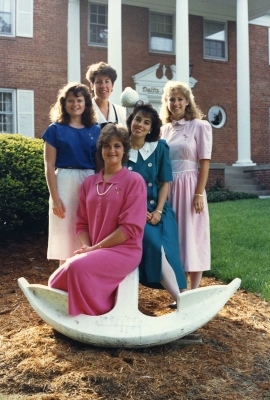
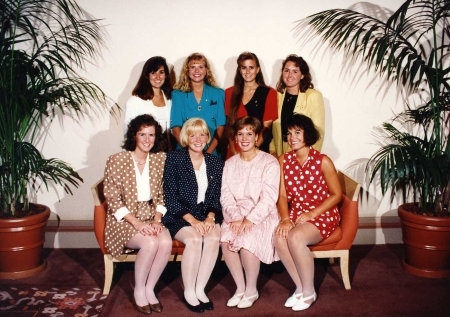 In 1990, the Delta Gamma Foundation started construction on “Project 1990,” dedicated to expanding Executive Offices. The Anchor In where many CDCs had trained and learned, was torn down to make way for an expansion onto Executive Offices for to both provide offices space for Foundation staff, and to provide increased training space and guest rooms for visiting volunteers and Consultants. The Dorothy Garret Martin Foundation Center was dedicated in April 1992, and remains a place where CDCs can gather and train.
In 1990, the Delta Gamma Foundation started construction on “Project 1990,” dedicated to expanding Executive Offices. The Anchor In where many CDCs had trained and learned, was torn down to make way for an expansion onto Executive Offices for to both provide offices space for Foundation staff, and to provide increased training space and guest rooms for visiting volunteers and Consultants. The Dorothy Garret Martin Foundation Center was dedicated in April 1992, and remains a place where CDCs can gather and train.